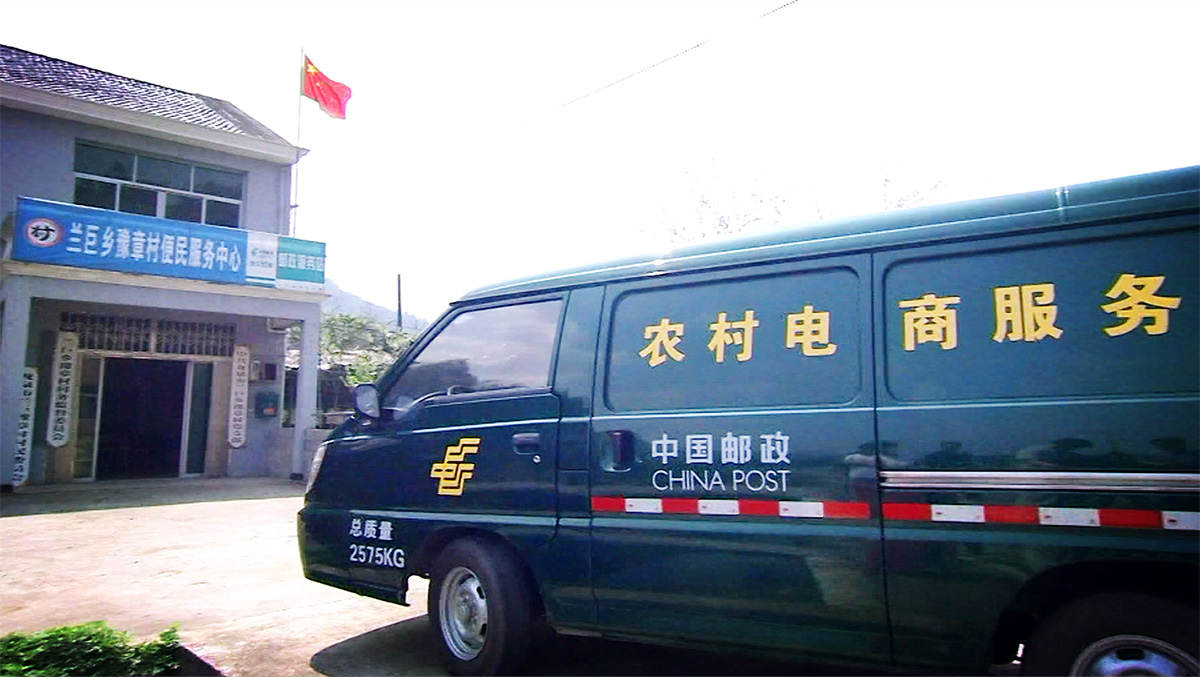


(Photo/Wang Jun)
From pure manual labor to human-machine collaboration, from grassroots companies funded by migrant workers to public companies which have become magnets for top talents, and from pure express delivery service to a variety of business relating to delivery, transport, and finance, China’s express delivery sector has developed into a star industry of the country in a short period of just 40 years.
According to a report on the development of China’s express delivery sector in 2018 released this April by China’s State Post Bureau (SPB), last year, China’s express delivery sector handled over 50 billion parcels and the employees in the industry amounted to 3 million.
In 2018, China’s express delivery companies provided services to an average of 280 million person-times of people per day, according to the report, suggesting that one out of five people in China was using express delivery services each day.
At present, the volume of parcels handled in China’s express delivery sector has surpassed that of the U.S., Japan and other developed economies in Europe. While ranking first in the world for five years in a row, the volume of parcels handled in China is three times more than that in the U.S., while also accounting for more than half of the volume of parcels in the world’s express delivery market.
Reform and opening-up: The accelerator of express industry in China
China’s express delivery sector started in 1979, when the Japanese courier company OCS started to cooperate with China National Foreign Trade Transportation Corporation and expanded its international express delivery business into the Chinese market.
In 1980, China Post started to provide international express mail services in China. In 1984, China Post rolled out domestic express mail services. A year later, China Post established its wholly-owned subsidiary, China Courier Service Corporation, Inc., and started to conduct comprehensive express delivery services. By the year 1992, China’s volume of parcels in the express delivery industry reached nearly 10 million.
In 1992, when China was at a crucial juncture of the implementation of its reform and opening-up policy, Deng Xiaoping paid an inspection tour to south China, where he delivered a series of speeches to further clarify the nature of special economic zones. The speeches started a new round of reform and opening-up boom in China, thus ushering in a brand new development stage for the Chinese economy.
A number of private companies sensed the great opportunity and sprung up all over the country, among which there were many courier companies.
In 1993, China’s express giant SF Express was founded, followed by ZJS Express Co., Ltd. in 1994, Yunda Express in 1999, YTO Express in 2000, ZTO Express in 2002, and Huitong Express in 2003, which later grew into Best Express.
Favorable policies and infrastructure construction boost high-speed development of express industry in China
In 2009, China enacted the new Postal Law, which for the first time clearly defined the legal status of courier companies, thus greatly unleashing the dynamism of market entities and bringing the express industry of China into a stage of rapid development.

A China Post van delivers goods to rural area. (Photo/China Post)
The key to the high-speed development of China’s express delivery industry is that China opened the market, which enabled full competition among private companies, state-owned companies, and joint ventures, said Gao Hongfeng, director of China Express Association and former vice minister of transport.
From 2010 to 2018, the compound annual growth rate of the volume of parcels handled by China’s express delivery industry reached 46.9 percent, 6 times that of the country’s GDP during the same period, as shown by official statistics.
“ZTO Express was experiencing difficult times from the time of its establishment up until 2009. Thanks to the reform of the national postal system and the new Postal Law enacted in 2009, private-run courier companies could finally gain legal status. Following, our development environment gets better and better after that,” said Lai Meisong, founder of ZTO Express.
Besides, infrastructure construction in China has also played a critical part in the growth of China’s express delivery sector.
In the early years since the founding of the People’s Republic of China, the country’s total highway mileage was only 81,000 kilometers, while its railway mileage totaled 22,000 kilometers, and there was no expressways in China at that time.
However, by the year 2018, China had already built 4.85 million kilometers of highways, 143,000 kilometers of expressways, 134,000 kilometers railways, 30,000 kilometers of high-speed railways, 235 civil aviation airports, and more than 3,600 cargo planes, with total mileage of highways and high-speed railways ranking first in the world.
The improvement in transportation capacity has enabled the country to realize 100 percent coverage within urban express delivery networks and more than 90 percent coverage in the express delivery networks found in rural areas.
3 million hardworking employees ensure quality express delivery services in every corner of China
In recent years, the development of China’s express delivery sector has received high attention from the Communist Party of China (CPC) Central Committee and the State Council of China.
In his new year speech in 2019, Chinese President Xi Jinping praised all delivery personnel for “contributing to the creation of our beautiful society”, affirming the important role of the express delivery sector in serving the country’s social and economic development and furthermore boosting convenience throughout people’s daily activities.
China’s express delivery workers amounted to 3 million in 2019. These delivery people provide high quality services for the whole country during all kinds of weather conditions. Their hard work, while driving forward the rapid development of the industry, is also rewarding themselves with the realization of their own value and a better life.
Chai Shanshan, a post-80s employee of China Post, has managed to transform himself from a migrant worker to a deputy at the National People’s Congress, China’s top legislature.

Chai Shanshan (Photo/Wang Xiaobo)
“I love this job. The past 15 years doing the job was also a spiritual journey, during which I had grown from a farmer to a qualified worker,” said Chai, to whom the job of delivering parcels is more about responsibility than merely a job.
The rapid development of China’s express delivery sector has not only brought convenience to people’s lives and assisted more migrant workers to blend in with city life, it is also playing an increasingly important role in serving economic development and boosting the revitalization of rural areas.
According to a supervision report on China’s express delivery market, the country’s express delivery sector had caused the initiation of 318 key projects in the manufacturing industry, with the projects covering various fields including aerospace, the auto industry, electronics, pharmacy, and clothing and generating around 940 million express delivery orders per year.
With the continuous development of the Belt and Road Initiative (BRI), China’s express delivery sector is seeing greater market demand for logistics services, as the trade between China and the countries participating in the BRI construction has been booming.
Chinese courier companies have grasped the opportunity and sped up their paces of exploring overseas markets one after another. Many courier companies have established cross-border e-commerce warehouses and industrial parks in foreign countries, integrated cutting-edge technologies and artificial intelligence into their parcel handling systems, and started making efforts to seek more environmentally friendly express delivery services.
 Fire brigade in Shanghai holds group wedding
Fire brigade in Shanghai holds group wedding Tourists enjoy ice sculptures in Datan Town, north China
Tourists enjoy ice sculptures in Datan Town, north China Sunset scenery of Dayan Pagoda in Xi'an
Sunset scenery of Dayan Pagoda in Xi'an Tourists have fun at scenic spot in Nanlong Town, NW China
Tourists have fun at scenic spot in Nanlong Town, NW China Harbin attracts tourists by making best use of ice in winter
Harbin attracts tourists by making best use of ice in winter In pics: FIS Alpine Ski Women's World Cup Slalom
In pics: FIS Alpine Ski Women's World Cup Slalom Black-necked cranes rest at reservoir in Lhunzhub County, Lhasa
Black-necked cranes rest at reservoir in Lhunzhub County, Lhasa China's FAST telescope will be available to foreign scientists in April
China's FAST telescope will be available to foreign scientists in April "She power" plays indispensable role in poverty alleviation
"She power" plays indispensable role in poverty alleviation Top 10 world news events of People's Daily in 2020
Top 10 world news events of People's Daily in 2020 Top 10 China news events of People's Daily in 2020
Top 10 China news events of People's Daily in 2020 Top 10 media buzzwords of 2020
Top 10 media buzzwords of 2020 Year-ender:10 major tourism stories of 2020
Year-ender:10 major tourism stories of 2020 No interference in Venezuelan issues
No interference in Venezuelan issues
 Biz prepares for trade spat
Biz prepares for trade spat
 Broadcasting Continent
Broadcasting Continent Australia wins Chinese CEOs as US loses
Australia wins Chinese CEOs as US loses